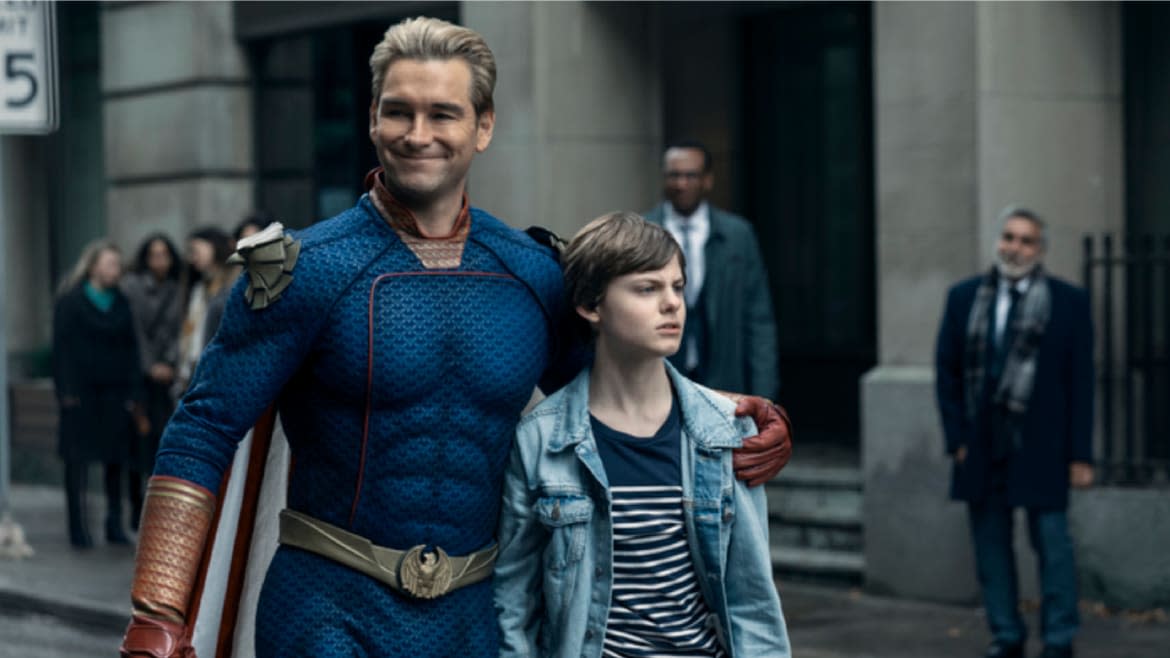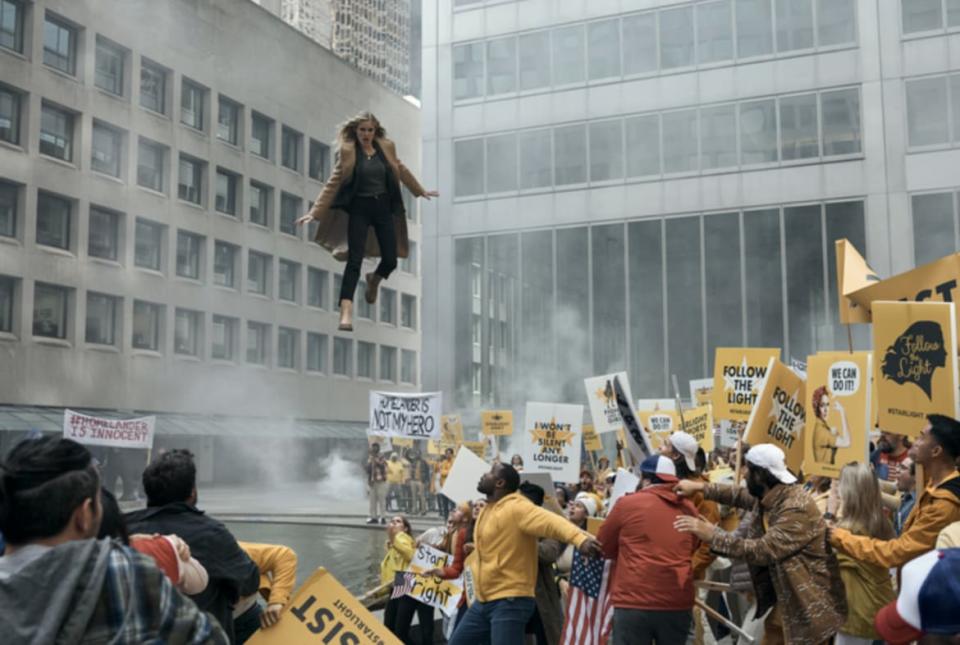‘The Boys’ Returns With More Fascism, Blood, and…Human Centipede Sex???

The Boys’ fourth season revolves around its numerous characters’ attempts to grapple with past mistakes, regrets, and traumas. Yet despite that narrative focus, Eric Kripke’s wild superhero series remains a forward-thinking affair that has its crimson-stained finger on the pulse of our present, dysfunctional American reality. Once again attuned to contemporary political and entertainment-industry discord, the Prime Video hit, which returns June 13, continues to use its comic book conceit to plumb the ugly depths of domestic strife and, in doing so, to trace the many steps that lead democracies into fascism. In terms of shining a spotlight on the factors threatening to transform the United States into a new extremist Reich, it’s as sharp as anything on television—not to mention as outrageous as ever, its satire infused with trademark X-rated explicitness.
While The Boys’ latest run may not feature a jaw-dropping sight to equals last season’s premiere-episode sex scene, that’s not for lack of trying; from a human centipede-style clone orgy and a photo of a gaping rear end to a gaggle of suped-up animals and, ultimately, a “murder boner,” Kipke’s series habitually pushes the boundaries of good taste. Such sensationalism is, on the one hand, simply a byproduct of its out-there sense of humor, which includes ceaseless creative profanity. However, it’s also central to its critique of a modern world that’s gone increasingly mad. Of course, in this universe, society has been fundamentally altered by Vought International’s Compound-V, a drug that bestows humans with extraordinary abilities. Yet despite its outlandish premise, Kripke’s saga (based on Garth Ennis and Darick Robertson’s comic of the same name) is vital for the ways in which it ridicules not merely its genre but, additionally, the current, perilous state of the union.
With 30-plus hours under its belt (not to mention last year’s spin-off Gen V, whose story and characters factor into this season), The Boys is chock full of plot, and it only gets more complicated in this return engagement. Having grasped that the public loves him whether he saves or slays innocents, psychotic “patriot” Homelander (Antony Starr) sets his sights on two related goals: finding new members for Vought’s Justice League-ish team The Seven, and molding his son Ryan (Cameron Crovetti) into a mini-me who’ll carry on his hateful legacy long after he’s gone (a pressing fear, given the gray hairs he’s sprouting and keeping in a jar). To accomplish the former, he hires Sister Sage (Susan Heyward), the world’s smartest person, who becomes integral to his plot to seize control of both Vought and America. With regards to the latter, he works hard to indoctrinate the boy with intolerance (“They’re only humans and toys for our amusement”) and, in the process, to sever the kid’s ties with Billy Butcher (Karl Urban), who’s intent on fulfilling his promise to Ryan’s mom (and his dead wife) Becca (Shantel VanSanten) to protect the adolescent from Homelander.
The Seven is a mess, with oceanic master Deep (Chace Crawford) hiding his ongoing love affair with an octopus (voiced by a famous not-to-be-spoiled-here actress), mute assassin Black Noir now played by a new actor who doesn’t understand his role, and speedster A-Train (Jessie T. Usher) terrified of Homelander and troubled by his crew’s unhinged behavior. Added to this mix is Sister Sage as well as Firecracker (Valorie Curry), a fanatical podcaster cut from an Alex Jones mold who spouts right-wing conspiracies and covets nothing more than being by Homelander’s side. To gain attention, Firecracker wages war against Starlight (Erin Moriarty), who’s hung up her Seven costume to work with the anti-supe Boys and to fight for liberal rights through the Starlight House, and their skirmish turns out to be just the cultural-war wedge Sister Sage needs to inflame an already combustible nation.

The Boys
There’s more—so much more!—in The Boys’ fourth season, whose do-gooder heroes are grappling with a considerable stockpile of sins. Frenchie (Tomer Capone) is dating a man with whom he shares a terrible connection. Kimiko (Karen Fukuhara) still isn’t over her conscripted-into-terrorism childhood. Hughie (Jack Quaid) is dealing with a family tragedy. Mother’s Milk (Laz Alonso) feels guilty for prioritizing work over his wife and daughter. Starlight is uncomfortable with her legacy and purpose. And Billy is so eager to do the right thing—by Ryan, America, and himself—that he’s routinely speaking with ghosts. On top of that, he’s struck an uneasy alliance with a former military compatriot (Jeffrey Dean Morgan) who wants to nudge the mercenary into taking drastic measures to end the Homelander menace.
This only skims the surface of The Boys’ latest go-round, whose plot centers on the impending presidential election victory of Robert Singer (Jim Beaver) and his running mate Victoria Neuman (Claudia Doumit), who’s secretly a head-exploding supe with ties to Homelander and the Boys. At times, Kripke’s tale can be a tad unwieldy; even long-time fans will find it challenging to completely keep up with its entanglements. Still, its energy is as electric as before, as are its performances, led by Urban as the inventively potty-mouthed Butcher and Starr as the chillingly unhinged Homelander, whose hang-ups are rightly described by one character as a “Freudian cesspool.” As always, the show is bursting with personality, and it’s spot-on in portraying January 6-style insurrection and brutal totalitarianism as an outgrowth of bigotry, insecurity, greed, and self-preservation instincts.
‘Presumed Innocent’: Jake Gyllenhaal’s New Show Is Summer’s Best TV Binge
Intent on biting off as much as it can possibly chew, The Boys references and ridicules a wide range of movies, TV shows, video games, and recent pop-culture happenings, be it a Vought expo announcement about “phases 7-19” of their film franchise, a not-so-subtle dig at The Batman, or an inspirational A-Train sports movie starring a cameoing Hollywood A-lister that’s eventually canceled because the studio “just realized we’d make more from the write-off.” Mocking the silly and the serious, the series takes no prisoners but simultaneously elicits empathy for (most of) its protagonists, whose screwy attitudes, ideologies, and actions can all be traced back to their tortured origins. Even when it becomes a tad too cumbersome for its own good, it’s a comic nightmare about America’s today and tomorrow.
Get the Daily Beast's biggest scoops and scandals delivered right to your inbox. Sign up now.
Stay informed and gain unlimited access to the Daily Beast's unmatched reporting. Subscribe now.


